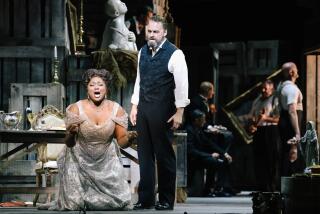OPERA REVIEW : Kraus and Van Dam Salvage Met ‘Hoffmann’
- Share via
NEW YORK — Offenbach’s “Les Contes d’Hoffmann” has seen better days at the Metropolitan Opera.
Otto Schenk’s crisply fanciful staging scheme of 1982, now entrusted to Lesley Koenig, has lost some of its original focus and momentum. Gunther Schneider-Siemssen’s lavish, ultra-clever sets are beginning to show signs of wear.
Sylvain Cambreling, the new conductor, paces Offenbach’s score with momentum that often exhilarates but sometimes invites frenzy. His quest for dramatic breadth is hampered, no doubt, by the Met’s stubborn preference for the time-dishonored Choudens edition.
The ultimate impact of the production now depends on who happens to be doing what to whom on the stage. On Thursday, Alfredo Kraus as Hoffmann happened to be victimized by the multiple nemesis of Jose van Dam.
Kraus remains one of the bona-fide wonders of the operatic world. He always was a singer of uncanny intelligence and refinement, a singer who valued poise and subtle inflection as much as dazzling assaults on the vocal stratosphere. At 62--repeat, 62--he still can offer object lessons in style, technique and, yes, freshness of tone.
He never did command the most sensuous sound in the world. It never mattered.
He always knew how to caress a phrase, how to shade a line, how to color a text. That mattered.
At an age when even his younger rivals and colleagues--you know who I mean--avoid the strain and exposure of extreme high notes, Kraus actually interpolates unexpected Bs and Cs. What’s more, he does so with nonchalant panache.
As Hoffmann, he exuded charm and innocence, elegance and bravado, poetry and ardor. He never forced, never cheated. True, he may have taken certain rhythmic liberties. He may occasionally have paused to catch his breath in an odd place. But an artist of his caliber can write his own rules.
He still sets the standard.
Van Dam refused to turn the challenge of the four villains into a camping trip. He savored the language and actually underplayed the grotesquerie. Witty and only mildly sardonic, he recalled the dangerous suavity of a Martial Singher rather than the elemental evil of a Norman Treigle. The approach proved eminently valid, ultimately fascinating.
More baritone than bass, Van Dam triumphed in moments of lyrical indulgence. It is difficult to recall Dappertutto’s spurious aria, “Scintille, diamant,” sung with such an insinuating legato, with such sensuous tone and such dynamic finesse.
If only the others in the cast could have revealed comparable insights bolstered by comparable resources. Catherine Malfitano came close with her generally luminous yet febrile Antonia. She was counterbalanced, however, by Erie Mills as a squeaky-cute Olympia and Tatiana Troyanos as a blowsy-fatale Giulietta. Brenda Boozer, probably better seen than heard as Nicklausse, seemed embarrassed by the restoration of the romanza, “Vous sous l’archet fremissant.”
Anthony Laciura sketched the four servant roles in relatively broad strokes. Donald Kaasch, the new Spalanzani, settled for easy buffo convention. Gweneth Bean intoned the music of Antonia’s Mother with amplitude more appropriate to an Erda.
In general, there are better ways of telling Hoffmann’s tales. Nevertheless, the Met did muster Kraus and Van Dam. One must be grateful for great favors.
More to Read
The biggest entertainment stories
Get our big stories about Hollywood, film, television, music, arts, culture and more right in your inbox as soon as they publish.
You may occasionally receive promotional content from the Los Angeles Times.










